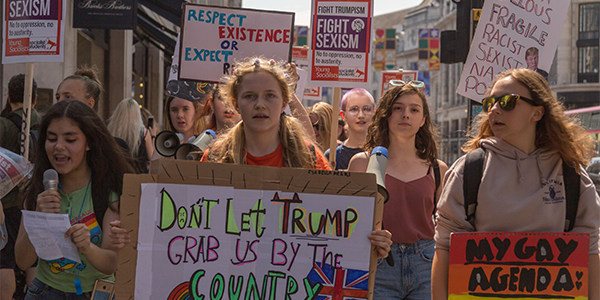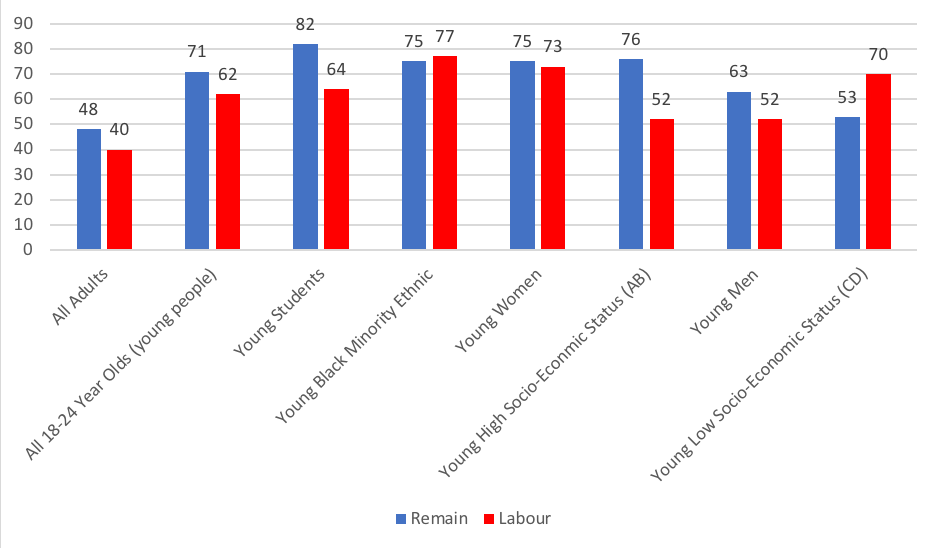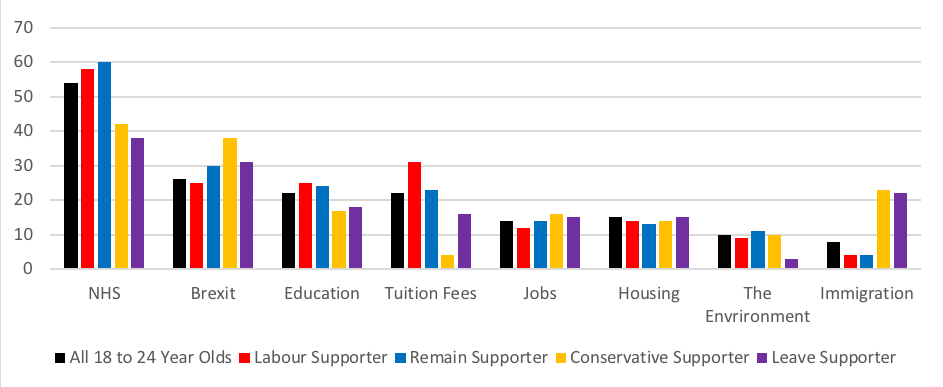Youthquake 2017: how the rise of young cosmopolitans in Britain could transform politics
In a new book, James Sloam and Matt Henn examine the much-disputed rise in political participation of 18–24 year olds in the UK. They find that the overwhelming majority share a set of cosmopolitan cultural values, which has significant implications for long-term voting patterns and the increasingly entrenched intergenerational politics.

Women’s March, 2018. Picture: Jane Scanlan, via a (CC BY-NC 2.0) licence
The 2017 UK general election was a landmark vote for young people. Younger citizens turned to the Labour Party under Jeremy Corbyn in their droves, as age replaced class as the best predictor of support for the two main parties. The election produced the largest gap in support for Labour and the Conservatives amongst 18–24 year olds for over 40 years, though much of this groundswell in support for Labour can be attributed to a hoovering up of votes from the Liberal Democrats (preventing any revival after the collapse of their 2015 youth vote) and the Greens (Figure 1).
Youth engagement also increased markedly in other ways. Firstly – and most controversially – in terms of their greater turnout. Although youth turnout figures are disputed (see here, here and here), most agree that the electoral participation of 18–24 year olds increased to levels not seen since the early 1990s. Secondly, after the Brexit referendum there was heightened discussion of politics online and through social media (over half of 18–24 year olds had consumed news about the election through these sources). There was also more intense party activism, with the Labour campaign group Momentum particularly successful in mobilising young activists – this is particularly intriguing given the ‘high cost’ of party activism compared to voting.
Figure 1: Party support amongst 18–24 year olds, October 1974–2017

Source: Sloam and Henn 2018
In our new book, we examine in more depth the development of young people’s values and political engagement in the UK, Europe and the United States before and since the financial crisis. We identify the growth of cosmopolitan values amongst younger generations, including a strong belief in human rights, a regard for outward-looking and inclusive societies, and a relatively relaxed attitude towards immigration. Indeed, the best predictor of whether a young person voted Remain in the 2016 EU referendum was their support for cultural diversity.
For decades prior to the financial crisis, we witnessed a gradual increase in liberal values amongst younger generations and a trend towards participation in non-electoral forms of politics – what Inglehart described as the ‘silent revolution’ in political life. Since the onset of the financial crisis, the divisions in cultural politics have become more pronounced. Norris and Inglehart explain Brexit and the rise of Donald Trump as part of a ‘cultural backlash’ against liberal values in society. This has been most prominent amongst older generations, men and those with low levels of educational attainment. Conversely, many cosmopolitan young people have been mobilised in support of a variety of (socially) liberal causes, movements and parties: from Occupy, to the Spanish Indignados, to Remainers in the EU referendum, to support for Podemos in Spain, Corbyn in the UK, and Bernie Sanders in the United States. It has also benefitted the emergence of young, socially liberal political leaders, including Jacinda Ardern in New Zealand and Justin Trudeau in Canada. The example of Trudeau demonstrates that support for social liberalism does not necessarily equate with heavily interventionist (classically left-wing) economic policies.
Of course, young people are not all the same. We identify more precisely the demographic profile of these young cosmopolitans, who voted Remain in 2016 and for the Labour Party in 2017. Figure 2 below shows that young Remainers and young Labour supporters represented 71% and 62% of 18–24 year olds in the UK. The figure rises amongst young students (in full-time education), young black and minority ethnic (BAME) citizens, and young women. The clear support of young women is interesting, given that there was no significant difference between support for Remain and Leave, or Labour and Conservatives, amongst men and women of all ages. We speculate that this might be a direct reaction to the male chauvinism inherent in high-profile global ‘cultural backlash’ movements: from the derogatory statements about women expressed by Donald Trump, to sustained attacks on campaigns (such as #MeToo) that highlight discrimination and abuse against women. We also note that more young people of low socio-economic status voted for Corbyn in 2017 than supported Remain in 2016. The reverse was true for young people of high socio-economic status.
Figure 2: Percentage of 18–24 year olds (sub-groups) supporting Remain in the EU referendum and Labour in the 2017 general election

Source: Sloam and Henn 2018
Conversely, there is a significant minority of young people who supported Brexit, who are deeply concerned about national identity and immigration, and who are attracted to authoritarian-nationalist forms of populism. These young people are disproportionately male, with low levels of educational attainment.
The similarities between young Remainers and young Labour supporters in their policy priorities is striking, and illustrated in Figure 3. The NHS was viewed as one of the most important issues by 58% of young Labour supporters and 60% of young Remainers, and by only 40% of young Conservatives and 38% of young Leavers (a gap of around 20 percentage points for both). Tuition fees were prioritised by 31% of young Labour and 23% of the pro-EU young Remainers, and only 4% of young Conservatives and 16% of young Leavers. Finally, only 4% of young Labour supporters and young Remainers believed that immigration was a priority (compared to 23% of young Conservatives and 22% of young Leavers).
Figure 2: Policy priorities (three most important issues) for sub-groups of 18–24 year olds

Source: Sloam and Henn 2018
In the UK, young people were outnumbered and outvoted in the 2016 referendum and the 2017 general election, but these two polls illustrated the hardening of intergenerational, cultural cleavages. According to our figures 61% of over-65s supported Brexit in the EU referendum, and the same proportion of this group supported the Conservative Party a year later. The inter-generational divide on cultural issues has major implications for the future of post-industrial democracies. New generations of young adults coming of age over the next decade are not pre-destined to hold more cosmopolitan views than older generations, but – if this trend continues – it will transform the political landscape.
This article gives the views of the authors, not the position of Democratic Audit. It draws on the authors’ book, Youthquake 2017: The Rise of Young Cosmopolitans in Britain, which is published in open access format, so can be downloaded free of charge here.
About the authors
 James Sloam is reader in politics at Royal Holloway University. His research focuses on youth, citizenship and politics in Europe and the United States, including articles in Comparative Political Studies (2014) and The British Journal of Politics and International Relations (2016). He also writes about the impact of new forms of political communication on the political participation of young adults (New Media and Society 2018). James is currently engaged in research projects on the impact of online political abuse on youth participation, and – with the Greater London Authority – on young Londoners’ perspectives on the United Nations Sustainable Development Goals.
James Sloam is reader in politics at Royal Holloway University. His research focuses on youth, citizenship and politics in Europe and the United States, including articles in Comparative Political Studies (2014) and The British Journal of Politics and International Relations (2016). He also writes about the impact of new forms of political communication on the political participation of young adults (New Media and Society 2018). James is currently engaged in research projects on the impact of online political abuse on youth participation, and – with the Greater London Authority – on young Londoners’ perspectives on the United Nations Sustainable Development Goals.
 Matt Henn is Professor of Social Research at Nottingham Trent University. His research focuses on voting behaviour and political engagement amongst young people globally. He has published numerous journal articles on youth and political participation, opinion polling in Eastern Europe, and political campaigning. He has recently been awarded funding by the Economic and Social Research Council to work on several research projects that focus on young people’s engagement with the political process, and consider such wider issues as political participation, voter apathy, and citizenship.
Matt Henn is Professor of Social Research at Nottingham Trent University. His research focuses on voting behaviour and political engagement amongst young people globally. He has published numerous journal articles on youth and political participation, opinion polling in Eastern Europe, and political campaigning. He has recently been awarded funding by the Economic and Social Research Council to work on several research projects that focus on young people’s engagement with the political process, and consider such wider issues as political participation, voter apathy, and citizenship.





 Democratic Audit's core funding is provided by the Joseph Rowntree Charitable Trust. Additional funding is provided by the London School of Economics.
Democratic Audit's core funding is provided by the Joseph Rowntree Charitable Trust. Additional funding is provided by the London School of Economics.